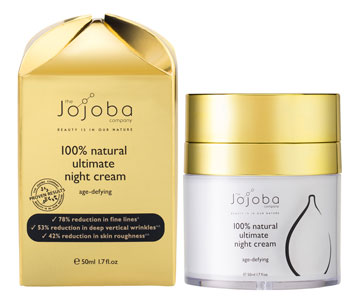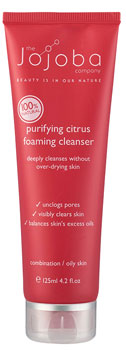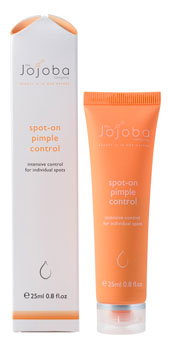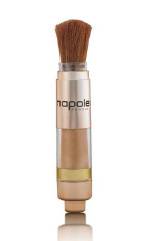Vicki Engsall Battling To Protect and Correct Our Skin Interview

Almost Half of Australians Have Had an Embarrassing Skin Condition
Our skin is the body's largest organ and it's most prone to the bumps and bruises of daily life. Along with hormones, changing climates and harsh detergents, it's not surprising that we are constantly battling to protect and correct our skin.
New research carried out by The Jojoba Company has found that more than half (56%) of Australians are continually experiencing problems with their skin. Surprisingly, 44% said that their skin has left them embarrassed with 1 in 10 admitting to hiding a skin condition from their partner.
While the main cause of irritation to our skin comes from stress (39%), other main contributors include soaps and detergents (35%). Whilst the humidity and hot weather cause 1 in 4 Australians to suffer from uncomfortable and irritated skin.
In a vicious cycle, while skin conditions may be caused by stress, skin conditions themselves lead to further stress. Almost half (48%) of women said that their confidence has been affected, leading to 13% becoming depressed and 14% not even wanting to leave the house due to their skin.
Vicki Engsall, co-founder of The Jojoba Company said, "Our skin is there to protect us and quite often it gives way due to a number of factors including the stress put on it both internally and externally. Things get out of balance, hereditary and hormonal factors come into play, people neglect their skin or choose the wrong products for it and the cycle begins."
Sydney based Naturopath, Rachel Aldridge tells us, "Skin health is often overlooked and misunderstood, from what products people use on their skin to the role that lifestyle, diet and gut health can have on it."
"I think it's important to try and understand what is causing the issues, is it food intolerances, gut health, hormones or stress? The relationship between the health of the gut and skin is strong and can be underestimated, while hormones and stress could be exacerbating the issue."
Whether it's scarring, rosacea, acne or eczema our skin can leave us desperately reaching for lotions and creams to help deal with irritated and unsightly skin conditions. However, while 48% will seek medical advice, 1 in 5 (21%) will do nothing and hope things return to normal.
With the seasons changing and warmer weather approaching, Rachel Aldridge offers some advice on how to deal with nagging skin conditions and help restore confidence.
 Rachel says, "Seeing someone like a qualified naturopath is often a good place to start understanding the bigger picture. While looking into natural products without chemicals is a good starting point."
Rachel says, "Seeing someone like a qualified naturopath is often a good place to start understanding the bigger picture. While looking into natural products without chemicals is a good starting point."
"I love jojoba because of its affinity with the skin and its ability to get right down into the layers of the skin instead of just superficially. I've seen jojoba working on a whole range of skin conditions, from basic redness and dryness, to eczema in babies to pimples in teens."
"The most important things you can do for your skin over summer are both to moisturise it and protect it. Most skin damage occurs due to sun exposure and dehydration."
Whilst Vicki says "Investing in a good SPF for not just the face but the whole body and a quality moisturiser that will actually penetrate the skin and not just sit on the surface of the skin are a must"
Aldridge recommends "Water, water, water! This is not to just stay hydrated through the warmer weather, but it will also to help the body move out any impurities."
"As a final suggestion, it is also really important to watch sugar consumption. Fruit in summer is wonderful, but, if you have really sensitive skin then opting for fruits such as berries over grapes is definitely the way to go."
As our skin provides the main barrier to infection, it's essential that it is looked after and protected. If you have a persistent skin condition talk to your doctor or pharmacist or alternatively search for a local naturopath.
New research carried out by The Jojoba Company has found that more than half (56%) of Australians are continually experiencing problems with their skin. Surprisingly, 44% said that their skin has left them embarrassed with 1 in 10 admitting to hiding a skin condition from their partner.
While the main cause of irritation to our skin comes from stress (39%), other main contributors include soaps and detergents (35%). Whilst the humidity and hot weather cause 1 in 4 Australians to suffer from uncomfortable and irritated skin.
In a vicious cycle, while skin conditions may be caused by stress, skin conditions themselves lead to further stress. Almost half (48%) of women said that their confidence has been affected, leading to 13% becoming depressed and 14% not even wanting to leave the house due to their skin.
Vicki Engsall, co-founder of The Jojoba Company said, "Our skin is there to protect us and quite often it gives way due to a number of factors including the stress put on it both internally and externally. Things get out of balance, hereditary and hormonal factors come into play, people neglect their skin or choose the wrong products for it and the cycle begins."
Sydney based Naturopath, Rachel Aldridge tells us, "Skin health is often overlooked and misunderstood, from what products people use on their skin to the role that lifestyle, diet and gut health can have on it."
"I think it's important to try and understand what is causing the issues, is it food intolerances, gut health, hormones or stress? The relationship between the health of the gut and skin is strong and can be underestimated, while hormones and stress could be exacerbating the issue."
Whether it's scarring, rosacea, acne or eczema our skin can leave us desperately reaching for lotions and creams to help deal with irritated and unsightly skin conditions. However, while 48% will seek medical advice, 1 in 5 (21%) will do nothing and hope things return to normal.
With the seasons changing and warmer weather approaching, Rachel Aldridge offers some advice on how to deal with nagging skin conditions and help restore confidence.
 Rachel says, "Seeing someone like a qualified naturopath is often a good place to start understanding the bigger picture. While looking into natural products without chemicals is a good starting point."
Rachel says, "Seeing someone like a qualified naturopath is often a good place to start understanding the bigger picture. While looking into natural products without chemicals is a good starting point." "I love jojoba because of its affinity with the skin and its ability to get right down into the layers of the skin instead of just superficially. I've seen jojoba working on a whole range of skin conditions, from basic redness and dryness, to eczema in babies to pimples in teens."
"The most important things you can do for your skin over summer are both to moisturise it and protect it. Most skin damage occurs due to sun exposure and dehydration."
Whilst Vicki says "Investing in a good SPF for not just the face but the whole body and a quality moisturiser that will actually penetrate the skin and not just sit on the surface of the skin are a must"
Aldridge recommends "Water, water, water! This is not to just stay hydrated through the warmer weather, but it will also to help the body move out any impurities."
"As a final suggestion, it is also really important to watch sugar consumption. Fruit in summer is wonderful, but, if you have really sensitive skin then opting for fruits such as berries over grapes is definitely the way to go."
As our skin provides the main barrier to infection, it's essential that it is looked after and protected. If you have a persistent skin condition talk to your doctor or pharmacist or alternatively search for a local naturopath.
Interview with Vicki Engsall, Co-Founder of the Jojoba Company
Question: Are you surprised that almost half of Australians have had an embarrassing skin condition?
Vicki Engsall: No, I am not surprised by this at all. Our skin is our largest body organ and if something is going on in our body, quite often, it will show up in our skin from one minor little pimple, which can be very embarrassing to some to full blown acne or eczema, dermatitis, psoriasis and other conditions. The amount of desperate people we get calling and emailing us every day for help and advice with their skin definitely is in line with these statistics.
Question: What impact does embarrassing skin conditions have on women's confidence and happiness?
Vicki Engsall: It can greatly affect women's mental health, confidence and happiness. In our research we have found that 14% of women who had an embarrassing skin condition became depressed and didn't want to leave the house and 1 in 10 women hiding this condition from their partner. So it has quite a big impact on confidence and happiness....well, we wear our face every day – there's no hiding it so it's not surprising.
Question: What advice do you have for women experiencing embarrassing skin conditions?
Vicki Engsall: The best advice that I could give it is to look at it from a holistic viewpoint. What is going on internally for it to show up in the skin so aggressively? Sometimes it could be something in the gut, stress or an underlying condition. A good starting point would be a naturopath. At the same time, I would recommend eliminating harsh soaps and detergents as these are a common cause of skin conditions. Many soaps, skin care products and detergents contain harsh chemicals which can both dry and irritate the skin so by eliminating these and stripping it back to natural and basic, you are going to give your skin a chance to repair itself and get off the rollercoaster. It is almost like a detox.
 Question: How does stress cause skin concerns?
Question: How does stress cause skin concerns?
Vicki Engsall: About 40% of skin concerns are caused by stress. When we get stressed, the level of the stress hormone, cortisol rises which can throw off the other hormones in the body and cause breakouts on the face and body and can actually cause oily skin. Other dermatological conditions such as psoriasis, eczema and other skin rashes are often reported by patients to be linked with their stress levels.
Question: How can we manage skin complaints especially as the weather warms?
Vicki Engsall: Hydration both internally and externally is vital. Drinking water will help to hydrate your skin and help prevent it from dehydrating. Using a good moisturiser is also very important to help prevent moisture loss from the skin throughout the day. A moisturiser that is natural and will penetrate into the deeper layers of the skin is important but also one that will create a non-pore clogging moisture barrier to help prevent moisture loss.
Question: What inspired you to create the Jojoba Company?
Vicki Engsall: My Dad planted jojoba on his farm in Yenda in South western NSW back in the year 2000. It takes 8 years for jojoba to yield a crop so in 2008 when he harvested his first crop I so was inspired by the amazing qualities of jojoba after having used it throughout my pregnancy and then on my baby that I knew that the world needed access to this amazing liquid. So we began to bottle it up and soon realised that it is the perfect hero ingredient for a skin care range so began developing a full range of products based around the unique qualities of jojoba.
Question: How is the Jojoba Company different to other skincare brands?
Vicki Engsall: The Jojoba Company skin care products all use jojoba as the hero ingredient and have the maximum amount of jojoba in every product complimented by potent active ingredients with clinically proven results. Most of the products are 100% natural so not only are our products very efficacious but they are also good for your skin and your health as they are free of irritants and nasty chemicals. We want every woman to love their skin unconditionally and bring out its natural beauty.
 Question: Which of the three Jojoba Company products could you not live without?
Question: Which of the three Jojoba Company products could you not live without?
Vicki Engsall: The ultimate jojoba youth potion, Ultimate jojoba absolute serum and Ultimate jojoba night cream. I can't live without these gold range products. I am in my very late 40s so I find these give my skin all the care it needs at my age and stage of life.
Question: Can you talk us through the options the Jojoba Company offers for severe adult acne?
Vicki Engsall: Firstly it is important to stop over cleansing and stripping the skin of vital moisture and oils with harsh chemicals that can irritate the skin and then cause the skin to be dehydrated which can make it worse.
At The Jojoba Company, we offer a natural alternative to help treat and relieve the symptoms of acne. The most important product to use is our pure jojoba. This will help to balance out the oil production in the skin, unclog the pores, dissolve excess oil and hydrate the skin. Jojoba is not an oil but a liquid wax ester which mimics our own skin oil so it works in harmony with the skin to help balance it out and unclog the pores and works as a natural anti-inflammatory. This is best used morning and night after cleansing. Our purifying citrus foaming cleanser is the perfect gentle cleanser for acne prone skin. In addition our Blemish Control serum contains natural anti-bacterial ingredients such as juniper and lavender to help keep further break outs at bay. We also have a great spot treatment which can be used as a mask as well as it is clay and zinc based. Many people have reported great results with their acne using our natural alternative.
Interview by Brooke Hunter
Vicki Engsall: No, I am not surprised by this at all. Our skin is our largest body organ and if something is going on in our body, quite often, it will show up in our skin from one minor little pimple, which can be very embarrassing to some to full blown acne or eczema, dermatitis, psoriasis and other conditions. The amount of desperate people we get calling and emailing us every day for help and advice with their skin definitely is in line with these statistics.
Question: What impact does embarrassing skin conditions have on women's confidence and happiness?
Vicki Engsall: It can greatly affect women's mental health, confidence and happiness. In our research we have found that 14% of women who had an embarrassing skin condition became depressed and didn't want to leave the house and 1 in 10 women hiding this condition from their partner. So it has quite a big impact on confidence and happiness....well, we wear our face every day – there's no hiding it so it's not surprising.
Question: What advice do you have for women experiencing embarrassing skin conditions?
Vicki Engsall: The best advice that I could give it is to look at it from a holistic viewpoint. What is going on internally for it to show up in the skin so aggressively? Sometimes it could be something in the gut, stress or an underlying condition. A good starting point would be a naturopath. At the same time, I would recommend eliminating harsh soaps and detergents as these are a common cause of skin conditions. Many soaps, skin care products and detergents contain harsh chemicals which can both dry and irritate the skin so by eliminating these and stripping it back to natural and basic, you are going to give your skin a chance to repair itself and get off the rollercoaster. It is almost like a detox.
 Question: How does stress cause skin concerns?
Question: How does stress cause skin concerns? Vicki Engsall: About 40% of skin concerns are caused by stress. When we get stressed, the level of the stress hormone, cortisol rises which can throw off the other hormones in the body and cause breakouts on the face and body and can actually cause oily skin. Other dermatological conditions such as psoriasis, eczema and other skin rashes are often reported by patients to be linked with their stress levels.
Question: How can we manage skin complaints especially as the weather warms?
Vicki Engsall: Hydration both internally and externally is vital. Drinking water will help to hydrate your skin and help prevent it from dehydrating. Using a good moisturiser is also very important to help prevent moisture loss from the skin throughout the day. A moisturiser that is natural and will penetrate into the deeper layers of the skin is important but also one that will create a non-pore clogging moisture barrier to help prevent moisture loss.
Question: What inspired you to create the Jojoba Company?
Vicki Engsall: My Dad planted jojoba on his farm in Yenda in South western NSW back in the year 2000. It takes 8 years for jojoba to yield a crop so in 2008 when he harvested his first crop I so was inspired by the amazing qualities of jojoba after having used it throughout my pregnancy and then on my baby that I knew that the world needed access to this amazing liquid. So we began to bottle it up and soon realised that it is the perfect hero ingredient for a skin care range so began developing a full range of products based around the unique qualities of jojoba.
Question: How is the Jojoba Company different to other skincare brands?
Vicki Engsall: The Jojoba Company skin care products all use jojoba as the hero ingredient and have the maximum amount of jojoba in every product complimented by potent active ingredients with clinically proven results. Most of the products are 100% natural so not only are our products very efficacious but they are also good for your skin and your health as they are free of irritants and nasty chemicals. We want every woman to love their skin unconditionally and bring out its natural beauty.
 Question: Which of the three Jojoba Company products could you not live without?
Question: Which of the three Jojoba Company products could you not live without? Vicki Engsall: The ultimate jojoba youth potion, Ultimate jojoba absolute serum and Ultimate jojoba night cream. I can't live without these gold range products. I am in my very late 40s so I find these give my skin all the care it needs at my age and stage of life.
Question: Can you talk us through the options the Jojoba Company offers for severe adult acne?
Vicki Engsall: Firstly it is important to stop over cleansing and stripping the skin of vital moisture and oils with harsh chemicals that can irritate the skin and then cause the skin to be dehydrated which can make it worse.
At The Jojoba Company, we offer a natural alternative to help treat and relieve the symptoms of acne. The most important product to use is our pure jojoba. This will help to balance out the oil production in the skin, unclog the pores, dissolve excess oil and hydrate the skin. Jojoba is not an oil but a liquid wax ester which mimics our own skin oil so it works in harmony with the skin to help balance it out and unclog the pores and works as a natural anti-inflammatory. This is best used morning and night after cleansing. Our purifying citrus foaming cleanser is the perfect gentle cleanser for acne prone skin. In addition our Blemish Control serum contains natural anti-bacterial ingredients such as juniper and lavender to help keep further break outs at bay. We also have a great spot treatment which can be used as a mask as well as it is clay and zinc based. Many people have reported great results with their acne using our natural alternative.
Interview by Brooke Hunter
Have You Seen This?
MORE









